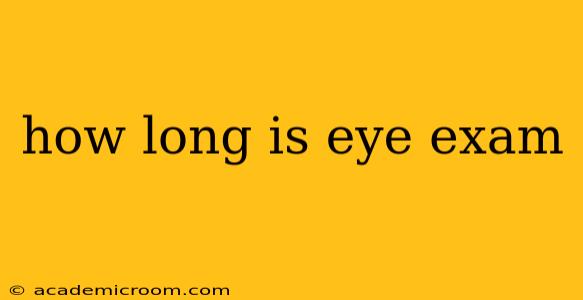How Long Is an Eye Exam? The Comprehensive Guide
The length of an eye exam can vary significantly depending on several factors. There's no single answer to "how long is an eye exam?", as it's highly individualized. This comprehensive guide will break down the different parts of an exam and explore what influences its overall duration.
Factors Influencing Eye Exam Duration:
Several elements determine how much time your eye doctor will spend with you:
-
Reason for the visit: A routine checkup will typically be shorter than an exam addressing specific concerns like blurry vision, headaches, or dry eyes. If you're experiencing vision problems or have a pre-existing condition, the eye doctor will need more time for a thorough investigation.
-
Age: Children's eye exams often take longer than those for adults because they may require more patience and specialized techniques to assess vision. Similarly, comprehensive exams for older adults often include more detailed assessments due to age-related changes.
-
Type of exam: A basic vision screening will be much quicker than a comprehensive dilated eye exam. A dilated exam involves eye drops to widen the pupils, allowing for a more thorough examination of the retina and optic nerve. This dilation process alone adds significant time.
-
Doctor's schedule: While less directly related to the exam itself, a busy doctor's schedule might influence the overall time spent. However, a good ophthalmologist or optometrist will always dedicate the necessary time to provide a thorough examination.
What Happens During a Typical Eye Exam?
A comprehensive eye exam typically involves several steps:
-
Visual Acuity Test: This assesses your ability to see at different distances using an eye chart. This is usually a quick procedure.
-
Refraction: This determines the correct prescription for eyeglasses or contact lenses using different lenses to find the clearest vision. This can take some time, particularly if you require a precise prescription.
-
Eye Muscle Movement Test: This checks the coordination of your eye muscles, often done using a penlight or similar tool tracking eye movements. This is a relatively quick step.
-
External Eye Exam: The doctor examines the eyelids, lashes, and surrounding structures for any abnormalities. This is generally quick.
-
Internal Eye Exam (often with dilation): This is the most time-consuming part, involving the use of special instruments to examine the retina, optic nerve, and other internal structures of the eye. This is where the dilation comes into play. It is critical for detecting certain eye diseases.
How Long Does a Comprehensive Dilated Eye Exam Take?
A comprehensive dilated eye exam, considered the most thorough type, can typically last 45 minutes to an hour or even longer. This is because the dilation process itself takes time, and the doctor needs time to carefully examine the internal structures of your eyes. Remember, this thoroughness is key to detecting potential eye diseases early.
How Long Does a Routine Eye Exam Take?
A routine eye exam, without dilation, might take anywhere from 20 to 40 minutes. This depends on the complexity of your visual needs and the presence of any concerns.
What if I Need Further Testing?
If the eye doctor identifies any potential issues during the exam, further testing might be necessary, significantly increasing the overall appointment time. This could include additional imaging tests, such as OCT (optical coherence tomography) or visual field testing.
In conclusion, there's a broad range for the duration of an eye exam. While a quick vision screening might only take 15-20 minutes, a comprehensive dilated eye exam can easily take an hour or more. The key is to communicate openly with your eye doctor about any concerns, ensuring they have sufficient time to provide a thorough and accurate assessment of your eye health.
